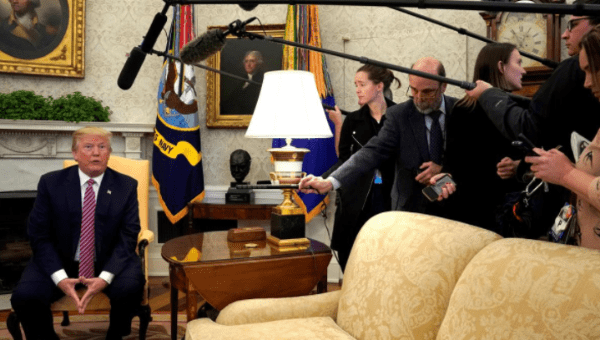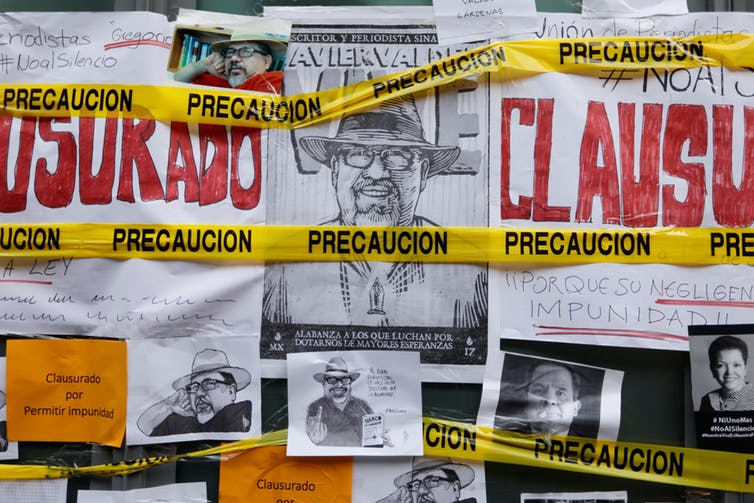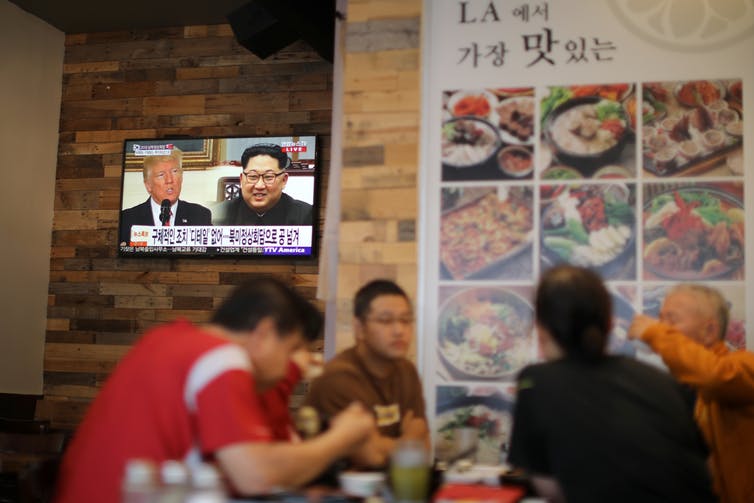Editor’s note: Kris Kodrich, associate professor in the Department of Journalism and Media Communication at Colorado State University, wrote this piece for The Conversation in June 2018. Colorado State is a contributing institution to The Conversation, an independent collaboration between editors and academics that provides informed news analysis and commentary to the general public. See the entire list of contributing faculty and their articles here.

President Donald Trump has strongly criticized journalists and their work, saying the “mainstream media” spreads “fake news” and distorts information about his administration.
Despite concerns that these presidential attacks could undermine press freedom in the United States, however, journalists continue to scrutinize Trump’s every action and tweet without hesitation, serving as an effective watchdog of government and society.
The New York Times and the Washington Post shared a Pulitzer Prize this year for, the judges said, their “deeply sourced, relentlessly reported coverage in the public interest that dramatically furthered the nation’s understanding of Russian interference in the 2016 presidential election and its connections to the Trump campaign, the President-elect’s transition team and his eventual administration.”
Trump’s rhetoric may have more dangerous consequences abroad. In January 2018, the independent nonprofit Committee to Protect Journalists awarded the president for “Overall Achievement in Undermining Global Press Freedom,” saying that Trump “has consistently undermined domestic news outlets and declined to publicly raise freedom of press with repressive leaders.”
Not number one
As a journalism professor and former reporter who studies international mass media, I find the challenges facing U.S. journalists today disturbing. But, on a global scale, they are relatively minor.
The United States ranks 45th out of 180 countries in Reporters Without Borders’ 2018 World Press Freedom Index, which measures pluralism, media independence, self-censorship, transparency and other conditions that support news production.
The ranking, published in April by the Paris-based not-for-profit, puts the U.S. well behind top-ranking Norway and Sweden and down two spots from 2017, but still far from bottom-of-the-pack Syria, Turkmenistan, Eritrea and North Korea.
As I tell my students, the U.S. press system has its faults, including concentration of ownership by huge corporations, which can homogenize national news, and continual cutbacks of resources.
But they probably won’t have to worry about being threatened, jailed or killed for doing their jobs.
Mexico: Reporters beware
That’s not true in Mexico, which has become the deadliest country in the Western Hemisphere for reporters.
Mexican journalists, who face threats from everyone from drug cartels to government authorities, have been under siege for years.
Six journalists were murdered in Mexico in 2017, and two have been killed so far in 2018.
In March, unknown assailants shot Veracruz crime reporter Leobardo Vázquez Atzin at his own restaurant in a town east of Mexico City. A month before, the 26-year-old magazine satirist and political columnist Pamela Montenegro was killed in Acapulco.
Reporters Without Borders ranks Mexico 147th in this year’s Press Freedom Index.

North Korea: Worst in show
In dead last place on the list is totalitarian North Korea, whose leader, Kim Jong Un, may soon meet Trump in a highly anticipated summit in Singapore.
In North Korea, the state-run Korean Central News Agency provides the only news that citizens are permitted to watch. The regime uses technology to control all domestic communications, including what goes out over the national intranet. There is no real internet.
Citizens caught accessing information from outside the country can be sent to concentration camps.
No independent journalism exists within North Korea’s borders.
The international democracy watchdog Freedom House gives it the lowest score in its Freedom of the Press index.

Russia: Jail time and assassinations
Russia, which ranks 148th in Reporters Without Borders’ global index, is a bad place for people who value independent, hard-hitting news.
Stories critical of President Vladimir Putin and his allies will often land a reporter in jail. Five journalists were imprisoned in 2017, according to the Committee to Protect Journalists. In early June a Russian court sentenced a Ukrainian journalist to 12 years in prison on espionage charges, which his lawyers said were politically motivated.
Not infrequently, Russian journalists are also killed as a result of their work. In 2017, the editor of an independent newspaper in Siberia – who was known for reporting on corruption – was found dead in his backyard with five bullet wounds. Another St. Petersburg journalist who exposed police brutality was beaten and died weeks later in the hospital.
Philippines: Presidential threats
Four reporters were killed in the Philippines last year – the most of any Asian country.
The government of President Rodrigo Duterte has pressured journalists through such means as licensing and public criticism. Before he was sworn in as president in 2016, Duterte also issued the grim warning that “Just because you’re a journalist, you are not exempted from assassination.”
In April 2018, radio journalist Edmund Sestoso died after being shot by an unidentified gunman. Authorities have said his murder may have been connected to his work as a journalist.
Trump’s praise of Duterte – with whom he says he has a “great relationship” – offers a tacit endorsement of this hard-line regime.
The Philippines ranks 133rd of 180 on the global press index.
Turkey: Worst jailer of reporters worldwide
Reporters in Turkey are more likely to end up in jail than journalists in virtually any other country in the world.
Last year, Turkey locked up 73 journalists on charges that included disseminating terrorist propaganda and other anti-state activities. As a result, it dropped two spots on the 2018 World Press Freedom Index, from 155th to 157th.
The Committee to Protect Journalists awarded President Recep Tayyip Erdoğan two prizes this year: “Most Outrageous Use of Terror Laws Against the Press” and “Most Thin-Skinned” leader.
“Turkish authorities have repeatedly charged journalists, news outlets, and social media users for insulting Erdoğan, insulting other Turkish leaders, and insulting ‘Turkishness’ in general,” the group says. The Turkish judicial system heard 46,000 cases along those lines in just one year.
President Trump was runner-up in that “thin-skinned” category because of his threats to reconsider libel laws and sue news outlets.
![]() Will freedom of the press endure his regular attacks on journalism? I believe it will, but reporters and First Amendment defenders alike should keep a close watch on this president.
Will freedom of the press endure his regular attacks on journalism? I believe it will, but reporters and First Amendment defenders alike should keep a close watch on this president.
This article was originally published on The Conversation. Read the original article.